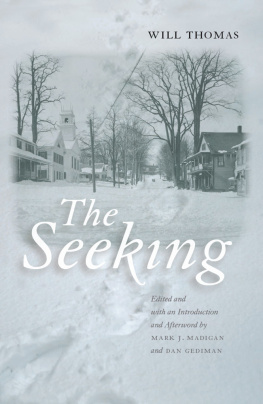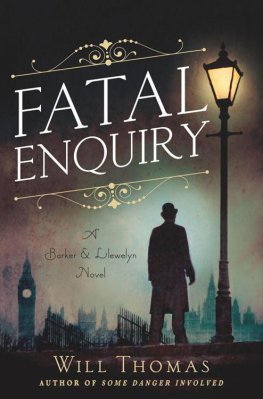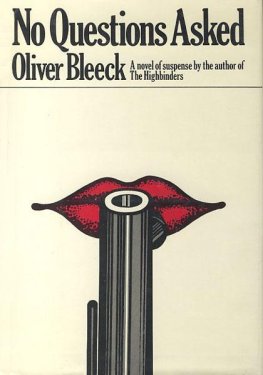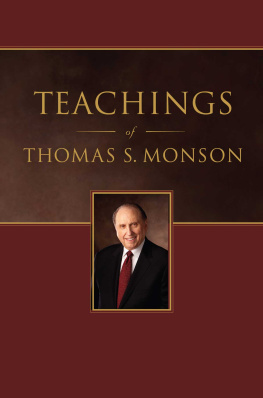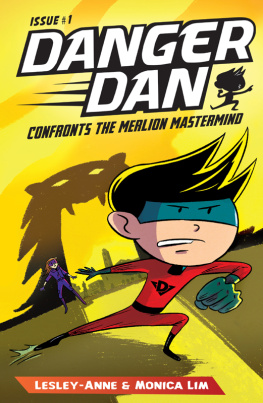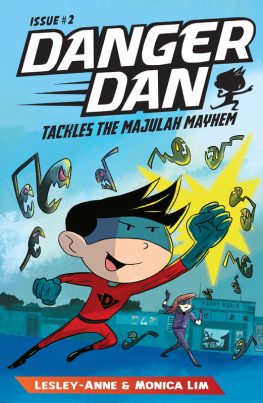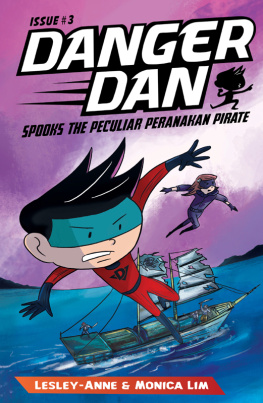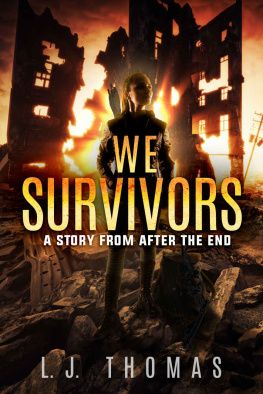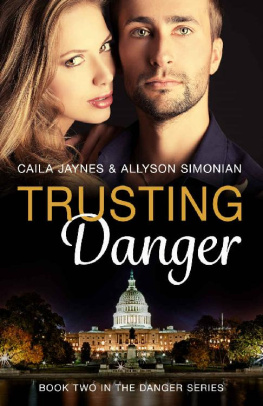Will Thomas - Some Danger Involved
Here you can read online Will Thomas - Some Danger Involved full text of the book (entire story) in english for free. Download pdf and epub, get meaning, cover and reviews about this ebook. genre: Detective and thriller. Description of the work, (preface) as well as reviews are available. Best literature library LitArk.com created for fans of good reading and offers a wide selection of genres:
Romance novel
Science fiction
Adventure
Detective
Science
History
Home and family
Prose
Art
Politics
Computer
Non-fiction
Religion
Business
Children
Humor
Choose a favorite category and find really read worthwhile books. Enjoy immersion in the world of imagination, feel the emotions of the characters or learn something new for yourself, make an fascinating discovery.

- Book:Some Danger Involved
- Author:
- Genre:
- Rating:5 / 5
- Favourites:Add to favourites
- Your mark:
- 100
- 1
- 2
- 3
- 4
- 5
Some Danger Involved: summary, description and annotation
We offer to read an annotation, description, summary or preface (depends on what the author of the book "Some Danger Involved" wrote himself). If you haven't found the necessary information about the book — write in the comments, we will try to find it.
Some Danger Involved — read online for free the complete book (whole text) full work
Below is the text of the book, divided by pages. System saving the place of the last page read, allows you to conveniently read the book "Some Danger Involved" online for free, without having to search again every time where you left off. Put a bookmark, and you can go to the page where you finished reading at any time.
Font size:
Interval:
Bookmark:
Some Danger Involved
Will Thomas
You are all fair, my love, and there is no spot in you.
Song of Solomon 4:7Prologue
If someone had told me, those many years ago, that I would spend the bulk of my life as assistant and eventual partner to one of the most eminent detectives in London, I would have thought him a raving lunatic. It was my intention from an early age to aspire to a quiet life of letters, an Oxford donship, if possible, with the occasional slim volume privately printed every couple of years. The last thing I expected was to live with permanently barked knuckles, bruises and contusions over most of my body, and the compulsion to scan every room I entered for the exits. Life doesn't always turn out as we plan. Perhaps for some of us that is a good thing.
I find myself at a loss when trying to describe my employer, Cyrus Barker, to someone who has never met him. He is, in turns, wise and stubborn, thoughtful and oblivious, gentle and terrifyingly lethal. I have seen him agonize over the pruning of a Pen-jing tree and grapple a man to the ground, both in the same day. For all that, I can state without hesitation that he is one of the most noble men I have ever known. He is also the most exasperating fellow in the world to work for, but he is a detective, not a saint.
Barker took me in off the streets in March of 1884 in circumstances I will relate presently. He clothed me, fed me, and provided a roof over my head. More importantly, he taught me skills that were only his to teach. So, while at first I thought myself ill-used, and thoroughly unequal to the duties Barker had asked of me, eventually I found the work stimulating and rewarding, with some reservations. Actually, with several reservations, but some things cannot be helped.
I'm going to relate the first case that Barker and I worked on together, the one that changed my life completely and that began what I've come to think of as my second education, in the School of the World. It took me into the very bowels of London and introduced me to people and places I would never have met otherwise. It also very nearly killed me. If I could change any aspect of work as an enquiry agent, it would be the danger, but then, Barker warned me on that very first day, right there in the advertisement.
1
Assistant to prominent enquiry agent. Typing and shorthand required. Some danger involved in performance of duties. Salary commensurate with ability. 7 Craig's Court.
So ran the advertisement in the "situations vacant" column of The Times for the fourth day straight. On the first day, a Monday, I had arrived early, but not early enough. A long queue of hopeful clerks was already spilling out into Whitehall Street. So many applicants were ahead of me, and so eminently more suitable did some of them appear, that after a quarter hour's turn I abandoned my place and went in search of more realistic prospects. The Tuesday advertisement was, I assumed, mere thoroughness on the part of the employer; at a shilling a line, he could afford to advertise for two days, though the position might be filled on the first. On Wednesday, I was intrigued, but my attention was drawn to a situation in Hammersmith for which I believed I might be better suited, one that didn't offer "some danger involved in performance of duties." But when the request appeared the fourth day, I exclaimed over the newspaper in the Reading Room of the British Museum and vowed to try my luck again. Like young Arthur standing before the Sword in the Stone, I assumed I couldn't fail worse than anyone else.
I set down my pasteboard suitcase on the pavement at the end of the queue and looked at the line of applicants. They seemed identical to the gentlemen from the first day. I am sure that many of them were better qualified than I, but none was as desperate. The cheap suitcase at my feet contained all that I owned in the world, all that was left that could not be pawned. That morning, I had abandoned the garret I occupied, several days in arrears of my rent, with but threepence to my name, which I squandered on a tin cup full of chalky coffee and one of the thick slices of bread and butter they call "doorsteps," at a stall in Covent Garden. This was to be my final day of hunting for a situation. If I was not gainfully employed by seven o'clock that evening, I planned to take one last look from atop Waterloo Bridge at the premier city in Christendom, then snuff this guttering candle with a long jump into the Thames. Truth be told, I almost wished for the release, for my shattered faith still clung to the belief that I might be reunited with my wife, dead now almost a year. It was a trade I would only too gladly make.
Although I did stand in line, pushing my suitcase forward every minute or two, my hopes were not sanguine. There is a look which comes into a prospective employer's eye when he glances through your references and comes across the words "Oxford Prison." It's not a happy look, but an interesting one: first the eyes pop open with astonishment; then the brows knit together in a solid scowl; finally one brow raises sardonically, as if wondering how you have the brass to go on breathing after such a disaster. There may be further ocular calisthenics, but I was usually out the door by that time, one step ahead of the boot. At first I had agonized over these dismissals, but lately I'd just grown bored with them. One can only go through so much eye popping before it begins to pall.
There was a high brick wall beside us, and unlike the other applicants, I took the opportunity to shelter myself from the cold March wind. Somewhere on the other side, I heard a sound, the soft, rhythmic slap of rubber on brick. Someone was practicing tennis, or a child was playing ball. I thought it bitterly ironic that not five feet away someone was enjoying his life, while I was so close to forfeiting my own. I was beyond the stage of anger, however, and merely prodded my suitcase forward another few inches, with the toe of my boot. As I reached the steps of the building, I noticed a dustbin off to the side. I felt it was an omen and tossed the suitcase into it. What need had I now for a few threadbare collars and some moldy books of poetry?
Finally, I squeezed my thin frame through the door, into a kind of waiting room. Inside, the applicants were seated in a row, across from a bored-looking fellow behind a desk, his face buried in the Police Gazette. He took my name and asked me to be seated, as if the request were a complaint. I had never been in the offices of a "prominent enquiry agent" before, but the room looked much like several antechambers of bureaucrats and barristers that I had visited in the area, during my long search for work. When I entered I felt a tension in the room beyond the mere suspense of waiting for an interview.
"This is a rum one, no mistake," an older applicant said to me in a low voice, as soon as I sat down in a newly vacated chair.
"Rum?" I asked. "How so?"
"His nibs here announces each candidate, who goes in through that yellow door there. Then they come out madder than a wet hornet. Some come out right away, some in five minutes, some ten, but each one acts like he's been horse-whipped. This fellow must be a regular tartar. It's no wonder he can't find someone to fill the post. If you can't stomach the interview, however will you get on with the situation itself?"
It was just as my neighbor had foretold. Each applicant went through the yellow door behind the desk with the fatalism of French noblemen going to the guillotine. Some were ejected immediately, indignant at being dismissed with a cursory glance. Others returned after a few minutes, with a scowl on their faces, and after a longer wait, one fellow stormed through the office amid a volley of curses and slammed the outer door, making us all jump. When it was my neighbor's turn, he tipped me a sly wink and sauntered in. After a few minutes he returned, favored us all with a bow, placed his silk hat atop his head, and walked out with a droll smile on his face.
Font size:
Interval:
Bookmark:
Similar books «Some Danger Involved»
Look at similar books to Some Danger Involved. We have selected literature similar in name and meaning in the hope of providing readers with more options to find new, interesting, not yet read works.
Discussion, reviews of the book Some Danger Involved and just readers' own opinions. Leave your comments, write what you think about the work, its meaning or the main characters. Specify what exactly you liked and what you didn't like, and why you think so.


